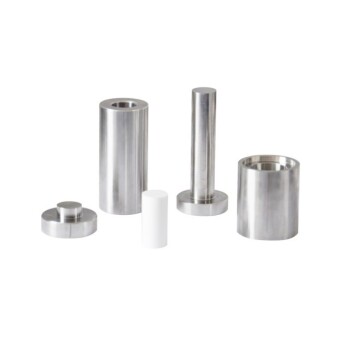In the modern laboratory, a hydraulic press serves two primary functions: precisely preparing samples for analytical testing and evaluating the physical properties of materials under controlled force. It is an essential tool for ensuring the consistency and reliability of data in research, development, and quality control environments.
At its core, a laboratory hydraulic press is not a manufacturing device. It is a precision instrument designed to convert a powdered or pliable substance into a uniform, solid sample suitable for analysis, or to test a material's response to a specific, measurable load.

The Core Functions: Sample Preparation and Material Testing
The primary value of a hydraulic press in a lab setting comes down to its ability to apply significant force in a highly controlled and repeatable manner. This capability is leveraged for two distinct but related purposes.
Preparing Samples for Spectroscopic Analysis
Spectroscopy techniques require samples to have a uniform density and thickness to produce accurate and repeatable results. A hydraulic press is the ideal tool for achieving this.
By compressing a powdered sample, the press creates a solid pellet that eliminates inconsistencies, ensuring that the analytical beam (like an infrared or X-ray beam) passes through a homogenous material.
This is a standard procedure for techniques like FTIR (Fourier Transform Infrared Spectroscopy), where a sample is mixed with potassium bromide (KBr) and pressed into a transparent pellet, and for XRF (X-ray Fluorescence) analysis.
Testing Material Strength and Durability
Another key application is in materials science and quality control, where the press is used to test a material's physical limits.
This involves applying a known compressive or tensile force to a sample and observing how it behaves. Technicians can measure the exact point at which a material deforms, fractures, or breaks, providing critical data on its strength and durability.
Why a Hydraulic Press is the Right Tool for the Lab
While other methods of compaction and force application exist, the hydraulic press offers a unique combination of benefits that make it indispensable for scientific work.
Unmatched Force Control and Consistency
Hydraulic systems operate on the principle of uniform pressure distribution, allowing for the application of a smooth, precisely measured force across the entire stroke. This ensures that every sample is prepared or tested under identical conditions, which is the foundation of reliable scientific data.
Versatility for Diverse Applications
The same press can be used with different dies and accessories to create pellets of various sizes, produce thin films, or conduct a range of compression tests on materials from polymers to ceramics. This makes it a flexible and cost-effective instrument.
Compact and Quiet Operation
Unlike their massive industrial counterparts, laboratory presses are designed with a compact footprint to fit within limited lab space. Their hydraulic operation is also significantly quieter than mechanical alternatives, contributing to a better working environment.
Understanding the Trade-off: Lab vs. Industrial Presses
It is critical to distinguish between laboratory presses and the large-scale hydraulic presses used in manufacturing. Confusing the two can lead to significant misunderstandings about their purpose.
The Goal: Analysis vs. Production
The function of a laboratory press is to prepare a small sample for analysis. Its success is measured by the quality and consistency of the scientific data it enables.
The function of an industrial press is to produce a finished part through processes like forging, stamping, or molding. Its success is measured by production speed, volume, and the quality of the final product.
Scale and Precision
Laboratory presses operate at a much smaller scale, prioritizing precision and repeatability over raw power or speed. They apply force typically measured in tons, not hundreds or thousands of tons. Industrial presses are built for high-volume, high-force manufacturing operations.
Making the Right Choice for Your Goal
To apply this knowledge effectively, consider your primary objective.
- If your primary focus is material characterization (e.g., spectroscopy): You need a press to create uniform pellets or thin films, as this is a prerequisite for generating accurate and repeatable analytical data.
- If your primary focus is physical properties testing: A press is essential for applying a controlled, measurable force to determine a material's strength, durability, and failure points.
- If your primary focus is manufacturing or large-scale forming: A laboratory press is the wrong tool; you require an industrial-grade press designed for production environments.
Ultimately, understanding that the laboratory press is a tool for scientific inquiry is the first step toward achieving reliable and insightful results.
Summary Table:
| Function | Key Applications | Benefits |
|---|---|---|
| Sample Preparation | FTIR, XRF analysis | Uniform pellets for accurate results |
| Material Testing | Strength, durability evaluation | Controlled force for reliable data |
Enhance your laboratory's precision and efficiency with KINTEK's hydraulic presses! Whether you're preparing samples for spectroscopy or testing material properties, our automatic lab presses, isostatic presses, and heated lab presses deliver unmatched force control and versatility. Serving labs in research, development, and quality control, KINTEK helps you achieve consistent, reliable data. Contact us today to discuss your needs and discover the perfect press for your applications!
Visual Guide

Related Products
- Laboratory Hydraulic Press 2T Lab Pellet Press for KBR FTIR
- Laboratory Hydraulic Press Lab Pellet Press Button Battery Press
- Automatic Laboratory Hydraulic Press Lab Pellet Press Machine
- Manual Heated Hydraulic Lab Press with Integrated Hot Plates Hydraulic Press Machine
- Manual Laboratory Hydraulic Press Lab Pellet Press
People Also Ask
- How do hydraulic press machines ensure precision and consistency in pressure application? Achieve Reliable Force Control for Your Lab
- What role does a laboratory hydraulic press play in carbonate powder prep? Optimize Your Sample Analysis
- How is a laboratory hydraulic press used for polymer melt crystallization? Achieve Flawless Sample Standardization
- What are some laboratory applications of hydraulic presses? Boost Precision in Sample Prep and Testing
- What role does a high-pressure laboratory hydraulic press play in KBr pellet preparation? Optimize FTIR Accuracy



















